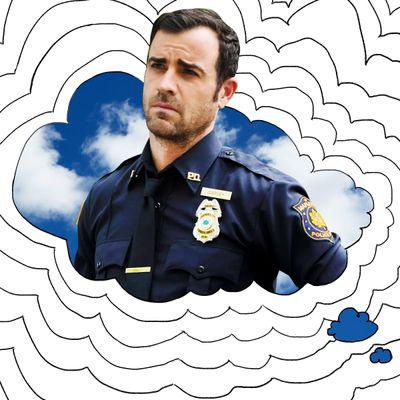
I Think About This a Lot is a series dedicated to private memes: images, videos, and other random trivia we are doomed to play forever on loop in our minds.
When I first started watching The Leftovers, I was hesitant about taking the plunge into its dark waters, which are filled with vanished people, freaky cults, and the many sad faces of Liv Tyler. But it wasn’t the riveting score or even the frequent shirtless shots of protagonist Kevin Garvey (Justin Theroux) that led me to endure unsettling dreams in pursuit of the binge. For me, it was the man-meets-bagel arc of its second episode, “Penguin One, Us Zero,” that revealed the true genius of the show: the ability to ground a hypothetical sci-fi premise — two percent of the world’s population mysteriously vanishing — in real, unflinching emotional pain. Hunting for his bagel, Kevin Garvey is all of us, clinging to gluten in the most uncertain of times.
The scene I’m fixated on happens at the police department in the town of Mapleton, New York. As Kevin, the chief of police, talks to Mayor Lucy Warburton in the office kitchen, he nonchalantly pops two halves of a bagel into the conveyor toaster. She’s accusing him of going insane, since he beat up a local cult member and went on a dog-shooting rampage — not on his own accord, he insists, but because he was taking the orders of an unnamed old man who follows him around in the middle of the night. As Kevin stands there waiting for his bagel to finish toasting, he relents to Lucy’s request that he simmer down, and the music turns to soft piano as he and the mayor find some common ground.
But the real drama of the episode comes when the mayor leaves, and Kevin is left alone with his ultimate battle: man versus toaster. The bagel has suddenly disappeared — nowhere to be found, even after he unplugs the toaster and slams it sideways against the counter, offering a colleague looking on in the background further evidence of his disintegrating sanity. He doesn’t succeed in finding his breakfast then, but storms into the police department later that evening to conquer the toaster once and for all.
He lifts it onto the table, takes out a screwdriver, and unscrews the back. The show’s signature score — a tense, staccato eruption of violin — plays as Kevin determinedly mines the toaster for his prized possession, gone but not forgotten (like the people who disappeared — get it?). And then, finally, the moment arrives: he lifts half a bagel, burnt to a crisp, from the depths of the toaster. Not yet satisfied, he continues plunging for the second half. He finds it. The camera cuts to an overhead shot, where we see Kevin sitting before the toaster, illuminated by a spotlight as the violin crescendos. He flips the bagel halves back and forth — just to be sure. A subsequent close-up of his face reveals a man both relieved and horrified, gripping onto the remnants of his known world while questioning his desperate need to prove it. The unflinching, sweaty-browed expression on Kevin’s perpetually concerned face reveals that he’s as relieved to find the bagel as he is ashamed of his quest.
The Leftovers, on a whole, is a particularly fascinating look at human trauma and the various ways we cope with the unknown. Kevin clings to a routine in an attempt to clutch onto life’s constants: he jogs, he wears aviators, he repeatedly calls his stepson, he eats carbs. (I like to ignore the fact that Justin Theroux himself is probably not eating all the bagels, pizza, and French toast mentioned on the show, in an effort to maintain his chiseled 12-pack.) For all his uncertainties, Kevin’s morning bagel provides some consistency. When the toaster threatens to consume his breakfast, defying logic and justice, he loses his grip on all things real. It’s only when he retrieves the burnt bagel that his faith in reason is restored, even if for a moment.
I’ve routinely found myself contemplating the emotional intensity that Kevin imbues into his bagel at my own breakfasts. After all, I too have relied on many a morning bagel to cope with the unpredictabilities of modern life. The morning after a date, wondering if I would ever receive another text from a handsome semi-stranger, I headed to Bagel Bob’s near Washington Square Park, hoping the fresh lox and doughy warmth would coax my anxieties and soothe my ailing heart (if not my impending heartburn). A trip to Russ and Daughters was the cure to a particularly brutal hangover, and fresh bagels — complete with Tropicana orange juice and Paul Simon playing through our speakers — has never failed to bring my family together on a Sunday morning. Raised in the Jewish faith, I’ve been programmed to worship the bagel almost as much as the holy text itself. In our tradition, bagels break fasts and offer comfort to the mourning; they sit, on a platter alongside tomato and capers, and offer a speckle of sesame-seed dusted hope amidst markers of tragedy and transience.
Unlike Kevin Garvey, I do not — and hopefully never will have to — face the consequences of a global Rapture. But when life seems to defy the very construct of reason, and all else seems to be slipping away, the tried-and-true bagel will always be there for me, at least for a moment. Even if it’s burnt.

